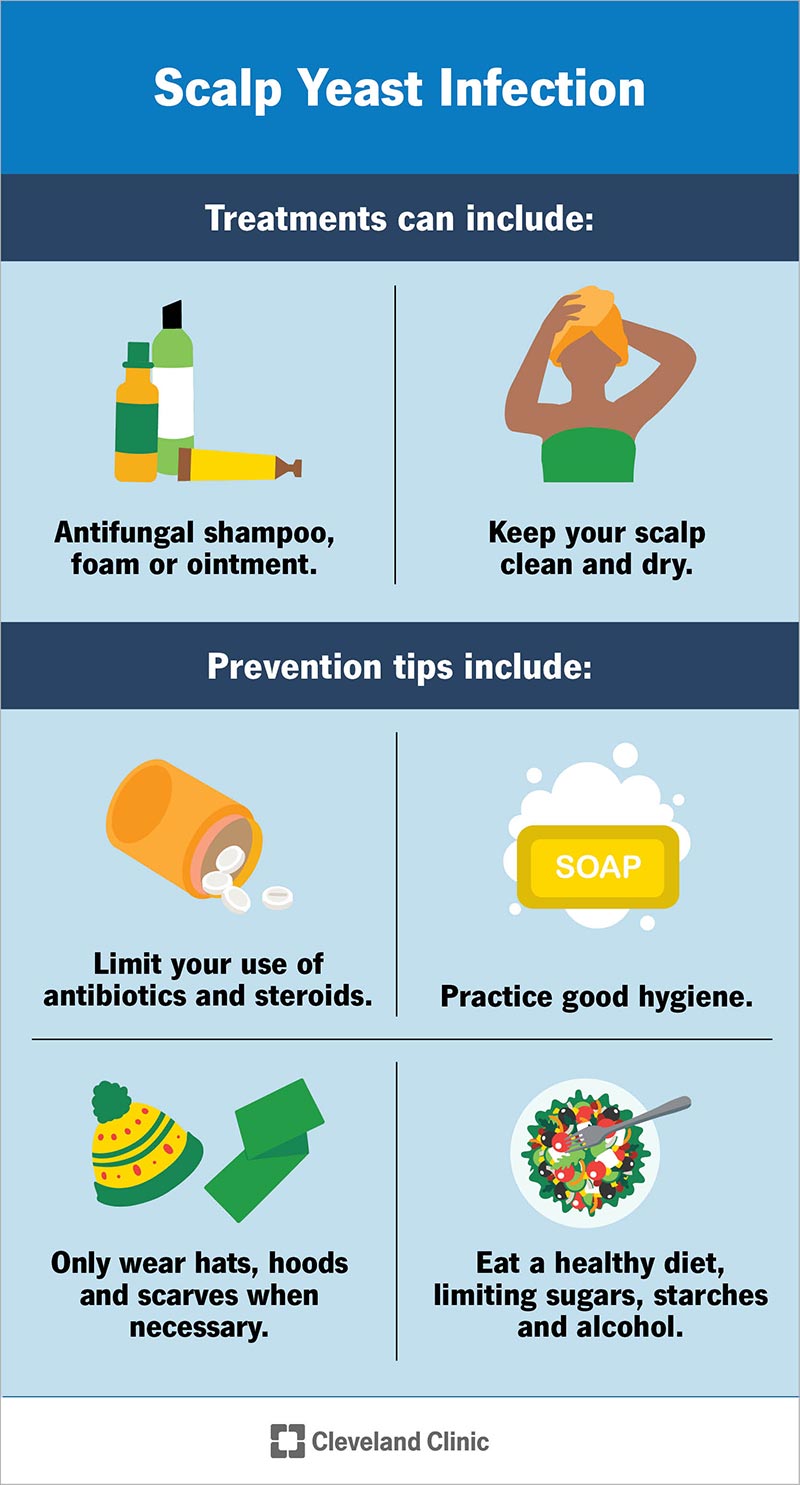A scalp yeast infection is a fungal skin infection caused by a yeast called Candida. It causes an itchy, flaky rash on your scalp. Candida grow and thrive in warm, dark environments. Treatment includes shampoos, foams or ointments. You can prevent scalp yeast infections by practicing good head hygiene and keeping your scalp clean and dry.
Advertisement
Cleveland Clinic is a non-profit academic medical center. Advertising on our site helps support our mission. We do not endorse non-Cleveland Clinic products or services. Policy
A scalp yeast infection is a yeast infection on the skin of your head. A yeast infection of the skin is called candidiasis. Candidiasis is a fungal infection that can develop almost anywhere in or on your body. A yeast called Candida causes candidiasis. Yeast is a type of fungus.
Advertisement
Cleveland Clinic is a non-profit academic medical center. Advertising on our site helps support our mission. We do not endorse non-Cleveland Clinic products or services. Policy
Your skin naturally has many types of fungus that live on it, including yeasts such as Candida. This is normal and doesn’t usually cause any problems for healthy people. But when Candida has the chance to gather, it can dig beneath the surface of your skin. This can cause a skin infection.
A yeast called Candida causes most scalp yeast infections or candidiasis. Candida can grow and thrive in warm, damp environments. Your scalp has a natural balance of yeast and bacteria. The bacteria help prevent the overgrowth of yeast on your skin. Sometimes your body’s natural balance of yeast and bacteria becomes unbalanced. When this happens, Candida has the opportunity to collect. Conditions that allow Candida to grow include:
Scalp yeast infections are more common in some groups of people. This includes people who are:
Advertisement
Yeast infections are also more common in people with weakened immune systems. This may be because of conditions such as diabetes or the use of medications that suppress your immune system.
A scalp yeast infection causes an itchy rash on your scalp. The rash may be red or purple and appear in patches of various shapes. The rash may crack and crusts may form. This crusting could cause hair loss. You may also notice:
Scalp yeast infections aren’t usually contagious. But if you have a weakened immune system, you should be more careful around people with yeast infections. People with weakened immune systems have a greater risk of catching an infection.
Your healthcare provider may perform a physical examination. Your provider may be able to confirm you have a yeast infection by looking at your scalp. Red or purple patches on your scalp could indicate a yeast infection.
Your healthcare provider may need to test a sample of the infected area. They’ll use a tongue depressor or scalpel to gently scrape some of the skin off your scalp. A laboratory technician will look at the sample under a microscope. They may place the sample in a culture. A culture lets the sample to grow so the type of fungus can be determined.

Image content: This image is available to view online.
View image online (https://my.clevelandclinic.org/-/scassets/images/org/health/articles/22967-scalp-yeast-infection)
Treatment for your scalp yeast infection may include an antifungal medication. Your healthcare provider may recommend an antifungal shampoo, foam or ointment. You can buy many antifungal medications over-the-counter. Your healthcare provider may prescribe a stronger antifungal option if needed.
It’s important to keep your scalp clean and dry as part of your yeast infection treatment. This can also help prevent a yeast infection on your scalp from returning.
You may be able to get rid of the yeast infection on your scalp with home remedies. Home treatment options haven’t been researched as thoroughly. You should ask your healthcare provider before trying any home treatment remedies. Home treatment options may include:
Healthy people can typically treat scalp yeast infections with antifungal shampoo, foam or ointment. Scalp yeast infections sometimes get better on their own. You can use home remedies and keep your scalp clean and dry.
Advertisement
Your scalp yeast infection may start to clear up within two weeks of beginning an antifungal treatment. Some scalp yeast infections may take longer — up to two months — to go away.
With treatment, scalp yeast infections usually go away quickly. But if left untreated, a scalp yeast infection can cause
Untreated candidiasis can cause serious medical complications if it spreads to other parts of your body. It can affect your bones, organs, digestive system, bloodstream, eyes and mouth.
You can prevent scalp yeast infections by practicing good hygiene. Keep your scalp clean and dry. In addition:
A scalp yeast infection can be itchy and unbearable. But the good news is that it’s easy to treat with antifungal medication such as shampoos, foams and ointments. You can prevent scalp yeast infections by practicing good head hygiene and keeping your scalp clean and dry. If you have itchy patches on your scalp, call your healthcare provider. They’ll be able to determine if you have a scalp yeast infection. They can recommend an appropriate treatment option for you. You’ll be back to feeling better soon.
Advertisement

Sign up for our Health Essentials emails for expert guidance on nutrition, fitness, sleep, skin care and more.
Learn more about the Health Library and our editorial process.
Cleveland Clinic’s health articles are based on evidence-backed information and review by medical professionals to ensure accuracy, reliability and up-to-date clinical standards.
Cleveland Clinic’s health articles are based on evidence-backed information and review by medical professionals to ensure accuracy, reliability and up-to-date clinical standards.
Cleveland Clinic’s primary care providers offer lifelong medical care. From sinus infections and high blood pressure to preventive screening, we’re here for you.
